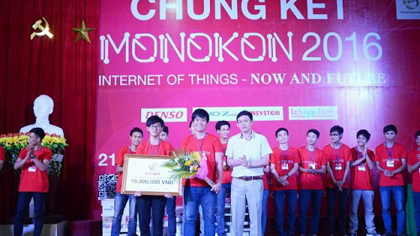Vietnamese freshmen create app that helps the paralyzed
Two students in Ho Chi Minh City have developed an application aimed at helping the paralyzed perform various actions beyond their capacity in the blink of an eye.
Do Thanh Phong and Dau Ba Kien, freshmen of the information technology faculty at the Ho Chi Minh City University of Science, are the developers of the supportive application, for which they were named the runners-up in a technology contest for students, Monokon 2016, in Da Nang City on May 21.
The two came up with such an idea after watching the film The Diving Bell and the Butterfly, which depicts the life of a man who suffered from locked-in syndrome, a condition in which the patient is aware but cannot move or communicate verbally due to complete paralysis of nearly all voluntary muscles in the body except for the eyes.
 |
| Dau Ba Kien (left) and Do Thanh Phong (middle) pose for a picture at the awards ceremony of Monokon 2016, a technology contest for students nationwide, in Da Nang City |
“When watching the movie, I always think of the well-known physicist Stephen Hawking who also falls victim to complete paralysis but awes the world with his great researches,” Kien told Tuoi Tre (Youth) newspaper when talking about his passion for helping the paralyzed perform daily tasks by themselves.
The application, created in three months, allows users to communicate via eye contact with a screen and a camera so as to make them more self-reliant, thus greatly enhancing their living experience.
Through the app, the user can easily turn on/off an electric fan or a light bulb as well as opening/closing doors, surfing websites, listening to music, reading online newspapers, and more – all by themselves within a few seconds.
But what truly highlights the duo’s creation is the emergency message feature which will send emails or text messages to users’ relatives when they have trouble.
“The paralyzed usually cannot land jobs so they merely earn a modest income, which makes most of them live in poverty,” Phong said.
“There are products supporting them in the world, but it is pretty costly to afford one, especially for those in Vietnam,” he added.
For such a reason the two only charge VND1.77 million (US$79) per item, much cheaper than imported devices, which cost thousands of dollars apiece.
Kien and Phong said that they are still working to optimize their product to attract attention from investors who will hopefully mass produce their creation for those in need.
(Source: TTO)
 về đầu trang
về đầu trang






